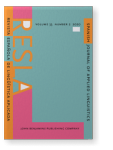Vol. 33:2 (2020) ► pp.416–442
Vol. 33:2 (2020) ► pp.416–442
Sources and steps of corpus lemmatization
Old English anomalous verbs
This article describes the steps and results of the lemmatization of the derived anomalous verbs of Old English. The data have been retrieved from The Dictionary of Old English Web Corpus, searched through the lexical database from the Nerthus Project called Norna. The methodology comprises several steps combining automatic searches on the lemmatizer and manual revision. Part of the results, including the verbs starting with the letters A to H, are compared with the Dictionary of Old English, while the rest of the lemmas are checked with the standard Old English dictionaries (Clark-Hall, Sweet and Bosworth-Toller). The discussion leads to the conclusion that the lemmatization of the verbs of Old English, a language with a remarkable degree of spelling variation, requires considerable manual revision. However, the progressive improvement of automatic searches, based on the comparison of the initial results with the available lexicographical sources, minimizes the need for manual adjustment.
Article outline
- 1.Aims and relevance of the research
- 2.Sources. The lemmatizer Norna
- 3.Research methodology
- 4.Results
- 5.Discussion
- 6.Conclusion
-
References
